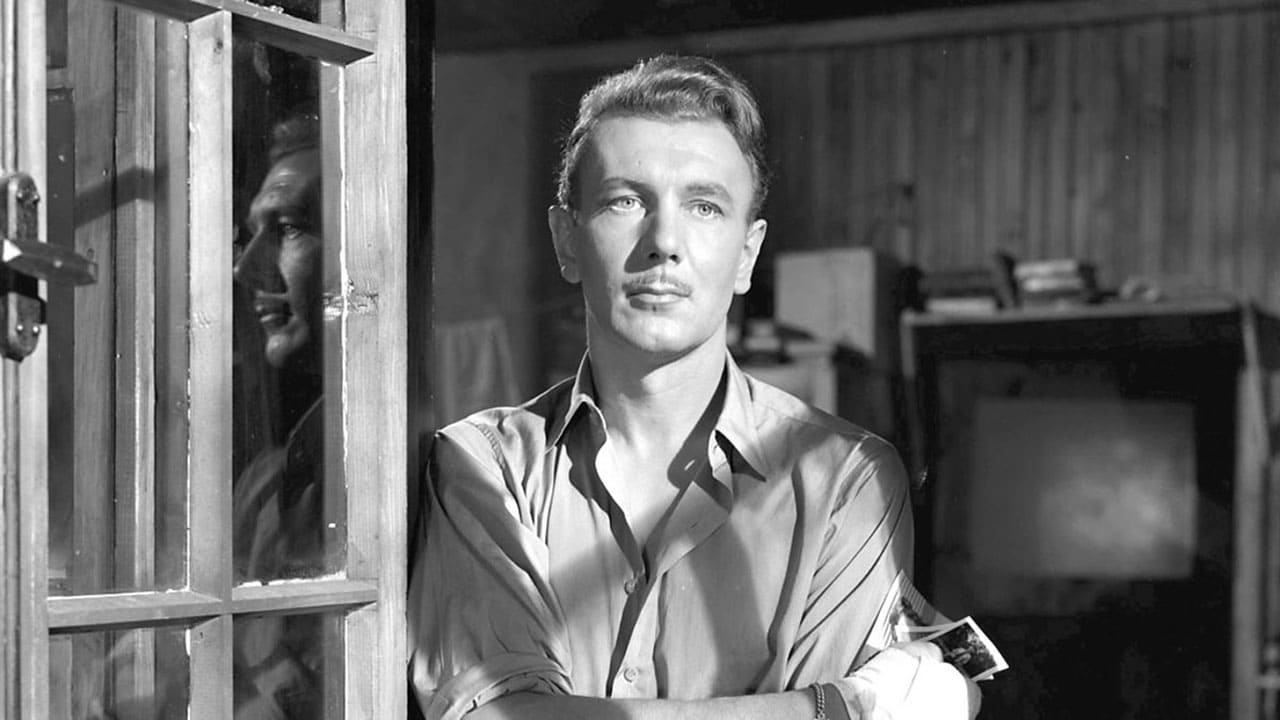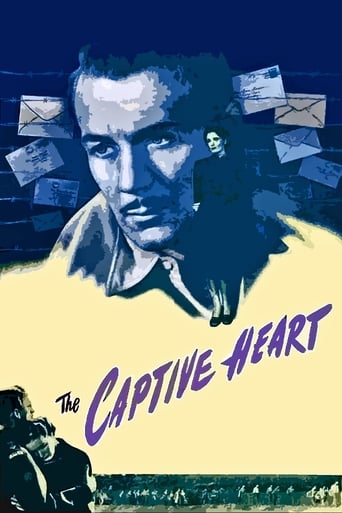

What a beautiful movie!
... View MoreThat was an excellent one.
... View MoreSome things I liked some I did not.
... View MoreThis film is so real. It treats its characters with so much care and sensitivity.
... View MoreHaving read a lukewarm review of "The Captive Heart" in Time Out (my cinema bible) and thinking, "They're bound to trash this one," I leaped to the IMDb reviews ready to play my "champion of the turkey" role. What a pleasurable surprise to find it not needed, that I am indeed at one with sympathetic users and critics alike in admiration for this rather special offering from the Ealing archive. Whereas the comedies from the West London studios are still admired with affection, their more serious fare tends to be overlooked. "The Captive Heart" is something of a forgotten treasure, a tribute in the wake of victory, to our gallant servicemen who spent much of the second world war as prisoners in German camps. It's another team piece in the mode of Carol Reed's better known "The Way Ahead" which takes a cross section of class types and closely observes their behaviour as they share an enforced coming together. It's all very stereotypical but if treated with sincerity, as in both films, a measure of character cliché can be forgiven. If the level of acting is fairly mediocre, particularly some of the women with those period prissy upper class accents, one part, that of Michael Redgrave as a Czech who has assumed the role of an English soldier killed in battle to escape being identified by the Germans, stands out for its quality. Where the film really scores is in its reminder of a time when people were really nice to one another particularly when brought together in adversity. Everyone mucks in to help, from comforting the young soldier when first confronted with the permanence of his lack of sight to the initially unsympathetic character who gives up his chance of repatriation to aid one who needs it more, welcome reminders of an age when it was generally normal rather than exceptional to emerge from the cinema feeling good.
... View MoreA diverse group of British prisoners of war wind up in a camp in Holland. Among the genuine men is a Czech escapee sought by the Gestapo, Michael Redgrave. He stumbled across the body of a British officer and assumed his identity. The Brits soon twig and are supportive but a Gestapo visitor, Karel Stepanek, keeps wondering where he met "Captain Mitchell" before. It seems only a matter of time.Escape being impossible, the men have little to do except create tiny gardens and cricket playing fields in order to create a little bit of England in the prison camp. And they wait for the mail. It's their lifeline to the outer world. For most of the men, the news from outside is good but we get to know the stories, in short flashbacks, of those whose messages are troublesome. A man's wife dies in childbirth. Another breaks off his engagement because he doesn't want his girl to know he's blind. Another gets a poison pen letter accusing his wife of infidelity.The man in the worst spot, of course, is Redgrave the impostor. The affable Gestapo officer remarks that Redgrave has been receiving mail but has written no letters in reply. Redgrave must write to a dead man's wife, but if he does, he can't tell her the truth because the mail is censored. In any case, his handwriting will give his secret away to the woman at the other end. So he does what any normal man would do to save his life -- he has his right hand smashed by a sledge hammer and writes with his left hand to mask his real identity.The movie is a tribute to the men who kept a stiff upper lip throughout their four-year incarceration and an encomium to the post. The real subject of the movie is the mail. The plot isn't very clear about the point but I believe the delivery of mail was handled through the International Red Cross in Switzerland.The men boarded up in camp don't really DO very much. There is no combat and only a few shots are fired. (They accidentally kill a guard dog.) There are longueurs, but in the end many of the prisoners are repatriated and sent back to England, including Redgrave, who manages to be included only at the sacrifice of another man's good luck.The scenes of the men's return are moving and adroitly handled. No one breaks into sobs. Deaths at home are accepted. Men's conflicts are resolved, happily in each case, and their families' too.It isn't a bad film, especially considering its period -- 1946. The war had just ended and no one was concerned about the Germans' feelings, yet the Germans we see are uniformly good-natured and reasonable. Not that we get to see much of them. And of course there is always the threat of the Gestapo for Redgrave to worry about. And none of the girls back home are glamorous either. Like their men, they look like ordinary people you might bump into at the supermarket.It's not as involving as, say, "The Best Years of Our Lives." That film dealt exclusively with the post-war adjustment of veterans. The bulk of this film, on the other hand, sticks us in a prison camp with nothing to do but plant leeks -- or maybe asparagus, which take seven years to mature. And there is no exciting central plot, no coordinated smash out, as in "The Great Escape." It's all rather understated, stiff upper lip, even Redgrave's final conciliatory phone call to the dead Mitchell's widow isn't heard against the background of celebratory fireworks on V-E Day.If it's a bit slow in the middle, it picks up the pace at the end and is a good watch.
... View MoreThe old saying if you're going to steal, steal from the best rings true in this case which is essentially In Which We Serve in khaki; both feature men in confined spaces reminiscing about their lives in Civvy Street with the main difference being that instead of a lifeboat we have a prison camp where a similar cross-section of Upper, Middle and Working Classes learn to rub along more or less amicably. For good measure they even ripped off the celebrated scene from Casablanca where the German singing is drowned out by 1) the Marseillaise and 2) Roll Out The Barrel, but the most blatant rip-off from the Coward masterpiece is in the two married couples, respectively Bernand Miles/ Joyce Carey/ John Mills/Kay Walsh and Jack Warner/Gladys Henson/Mervyn Johns/Rachel Thomas, who were friends before the war so much so that the two wives move in together for the duration; in each film one wife is killed and the news is broken to the widower via a letter from home to the other man so here Jack Warner gets to tell Mervyn Johns that Rachel Thomas is dead. This to one side The Captive Heart remains a compelling film because at its heart (sorry about that) is the wonderfully low-key love story between Michael Redgrave and his real-life wife Rachel Kempson of which 95 per cent is played out via under-stated letters which only mention love between the lines. The support is largely sound and trivia buffs will be interested to note that two years earlier (1944) Meriel Forbes had married Ralph Richardson so that the film boasted the real-life wives of two future theatrical knights. One to buy on DVD.
... View MoreGreat plot, excellently under-stated performances, writing and direction. The fact that this film was made in 1946, so close to the events its depicts, seems to add an almost documentary-like quality to this film. Indeed, in the opening credits, the line 'Filmed in the British Zone of Western Germany' suggest that the realistic prison-camp scenes were probably shot in genuine locations. The cast is almost a repertory company of British 1940s actors - but no-one is taking an easy ride. There are fresh and challenging performances, even though the faces are familiar. What struck me is how the film is free of the gung-ho 'smart prisoners, dumb Krauts' type of prison camp film that dominated the genre later on. This film is the product of a people tired of war. At the same time, it retains some of the stiff upper lip feel of many British wartime films, but with the confidence of victory, it does not need to indulge in the 'beastly Hun' elements. Moving without being sentimental. A very 'human' film, only a few steps short of a masterpiece.
... View More